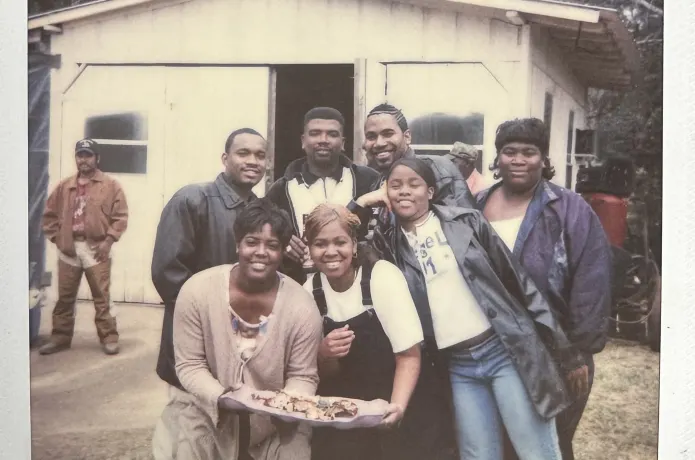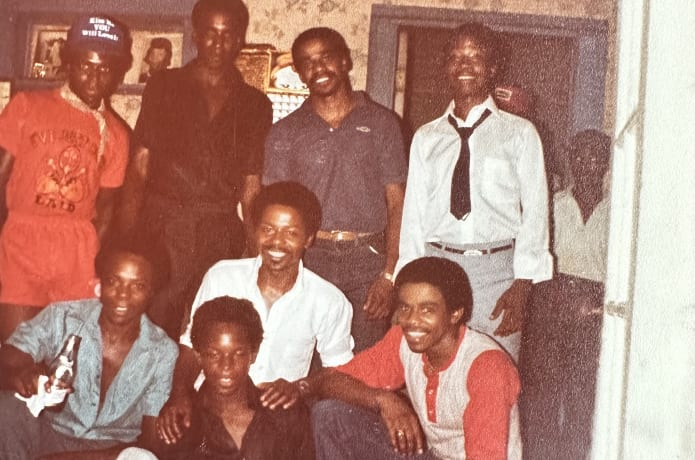( ENSPIRE Entertainment ) Emmy-Winning Veteran’s Documentary Illuminates The Power Of Land Ownership In The Face of Adversity
In a decisive move that blends personal history with a broader narrative of Black resilience, Emmy Award-winning producer and military veteran Dario Harris is set to release his profoundly personal feature documentary, “Legacy of Land.” This film promises to delve into the often-overlooked history of wealthy Black landowners. Explicitly focusing on Harris’ family and their remarkable story of prosperity and community building during the challenging Jim Crow and Prohibition era. “Legacy of Land” is more than just a historical account; it’s a reclamation of a family’s extraordinary story, a testament to the power of resilience, and a vital lesson in generational wealth. Through the lens of his great-grandparents, James and Bessie Ham, Harris unearths a narrative of land ownership, community empowerment, and unwavering self-sufficiency.
“I always wanted to tell my family story,” Harris shares, candidly acknowledging the initial hesitation. “But I struggled to question whether my family history was that important.” This doubt, however, gave way to a powerful realization: “Our story is just as important as any others, and no one can tell my family’s story better than I can.”

The film reveals James Ham as an entrepreneur, a man who refused to be confined by the limitations of his time. Amassing over 500 acres of land, he secured his family’s livelihood and dignity. “For any Black man in the 1930s who could obtain that amount of land, it meant power and self-sufficiency,” Harris explains. This legacy resonated deeply, shaping his path as an independent filmmaker. “The spirit of my ancestors is deeply rooted in me. Where there’s a will, there’s a way.”
Harris’s documentary centers on his great-grandparents, James and Bessie Ham. They defied the odds by acquiring and maintaining substantial land holdings. Their story is one of entrepreneurial spirit, community leadership, and a profound sense of self-sufficiency. The film aims to capture the essence of their achievements, highlighting how they not only thrived personally but also contributed to the well-being of their community and bridged racial divides in the process.
Given your background as a military veteran and an Emmy Award-winning producer, what inspired you to shift your focus to this deeply personal and historical project, “Legacy of Land”?
I always wanted to tell my family story, but I struggled with questioning whether my family history was that important. I dealt with doubt for years – but after watching a few more documentaries, it hit me that our story is just as important as any others, and no one can tell my family’s story better than I can.
How did uncovering the story of James and Bessie Ham and their remarkable impact on their community during Jim Crow shape your understanding of your family history and your place in the world?
My great-grandparents, especially James Ham, weren’t keen on working for anyone. He was an entrepreneur since his late teens, and once he got into farming and owning land, I think it solidified his stance in the world because he was able to amass 1500 acres of land at one point. He ended up owning 500-plus acres for decades. For any black man in the 1930s who could obtain that amount of land, it meant power and self-sufficiency.
When I arrived in the early 80s, I was fortunate to experience the freedom of having that much land. Seeing my uncles and other family work the land and live off the land, I learned the rewards of working hard for yourself, not corporations. Those lessons forever ring loud in my mind as a black independent filmmaker. The spirit of my ancestors is deeply rooted in me. Where there’s a will, there’s a way.
The film highlights the significance of black land ownership in building generational wealth. How does this history resonate with Black communities’ challenges and opportunities today?
Since filming this project and speaking about it with various people, I’ve learned that many black families directly identify with this story. They’re dealing with family division because they may feel the land hasn’t been divided as intended. We’re addressing typical issues within black families. We’re also highlighting the importance of black landownership. Today, there are still limited opportunities for us to buy land. However, the challenges we face with inflation and the government still finding ways to take our land are why we need to have more conversations in our households about purchasing, maintaining, protecting, and keeping land within our family through wills and trusts.
“Legacy of Land” tells a story of land ownership and emphasizes the importance of community and unity. In a time of increasing division, what lessons can we learn from James and Bessie Ham’s example?
One of the biggest lessons I learned from my great-grandparents is investing in your community, respecting others, and commanding your respect in return. No one would take advantage of James Ham or anyone in his family. My great-grandparents had black and white friends at a time when it was condemned. I saw the love and respect the community gave James Ham. Even today, I’m still learning new stories as this project comes out. Hearing people who knew my great-grandparents express their admiration for them is fascinating. I strive to be remembered in the same way. That’s why I pour into the surrounding people, no matter your race or background.
As a filmmaker, how did you approach the responsibility of telling this important historical story with sensitivity and authenticity while also making it accessible and engaging for a contemporary audience?
I did a lot of research, took notes, and reminded my family why our story mattered. What my great-grandparents did for our family isn’t shared by far, especially for a black couple in the South during times like the Prohibition era.
What are your hopes for the impact of “Legacy of Land”? How do you envision this film contributing to conversations about history, social justice, and the importance of preserving family legacies?
I want the world to know about the Ham family and why our legacy is important. The goal is to use our story to spark much-needed conversations about family land and the importance of a family trust. We hear and see so many stories of black families losing their land because they either sold it, couldn’t pay taxes, or were robbed by the government. I’m fortunate to say that today, my family still collectively owns 500-plus acres in Boston, GA. My goal is to be able to help my family keep the land for another 100 years or more.
Beyond filmmaking, how are you using your platform and influence to address social justice issues and empower future generations?
I consider myself to be an activist filmmaker. Every project must have its moment of truth to educate the audience in some way while entertaining. I’ve done projects about breast cancer in black women, suicide, lynchings amongst black men, and the racial biases we face as blacks in America. I don’t take my platform for granted. If I’m not using my art to address essential issues of the time, then I’m not truly fulfilling my purpose here. Also, every project must not be driven by social issues that burden our hearts. I do understand that there’s a balance in everything.

“Legacy of Land” transcends a personal narrative, becoming a mirror reflecting the challenges and opportunities Black communities face today. “Many Black families directly identify with this story,” Harris observes, highlighting the ongoing struggles with land ownership and family division. He underscores the importance of conversations about “how to purchase, maintain, protect, and keep land within our family through wills and trusts.”
The film also emphasizes the power of community and unity, lessons gleaned from James and Bessie Ham’s example. “One of the biggest lessons I learned from my great-grandparents is investing in your community, respecting others, and commanding your respect in return,” Harris says. Their ability to forge relationships across racial lines during deep segregation speaks volumes about their character and the enduring power of human connection.
Harris approached this project with a profound sense of responsibility as a filmmaker. “I did a lot of research, took notes, and reminded my family why our story mattered,” he shares. His commitment to authenticity is evident in the film’s nuanced portrayal of history, ensuring the Ham family’s legacy is honored and understood.
With “Legacy of Land,” Harris aims to spark conversations about the importance of preserving family legacies and the enduring significance of land ownership. He envisions it as a catalyst for discussions about “family land and the importance of a family trust.” His goal is to ensure that his family’s 500-plus acres remain intact for generations to come. The film is expected to contribute to a broader dialogue about social justice and the need to recognize the contributions of Black individuals and communities to the fabric of American society.
Harris’s background as a military veteran and an Emmy-winning producer brings a unique perspective to this project. His commitment to storytelling that educates and empowers is evident in his desire to share this important chapter of American history. “I consider myself an activist filmmaker,” he states. Every project must have its moment of truth to educate the audience in some way while entertaining.”
“Legacy of Land” is a timely and essential film that promises to shed light on a vital aspect of Black history. Through the story of James and Bessie Ham, Dario Harris invites us to reflect on the importance of land ownership, community, and the enduring legacy of resilience. As he continues to use his platform to amplify marginalized voices, Harris reminds us that our stories, no matter how personal, can shape a more just and equitable future. ENSPIRE Magazine eagerly anticipates the release of this significant documentary.
Related Articles: Salah Bachir is a Publishing and Entertainment Trailblazer, Empowering Dreams: The Entertainment Community Fund’s 2023 Alex Dubé Scholarship Recipients







